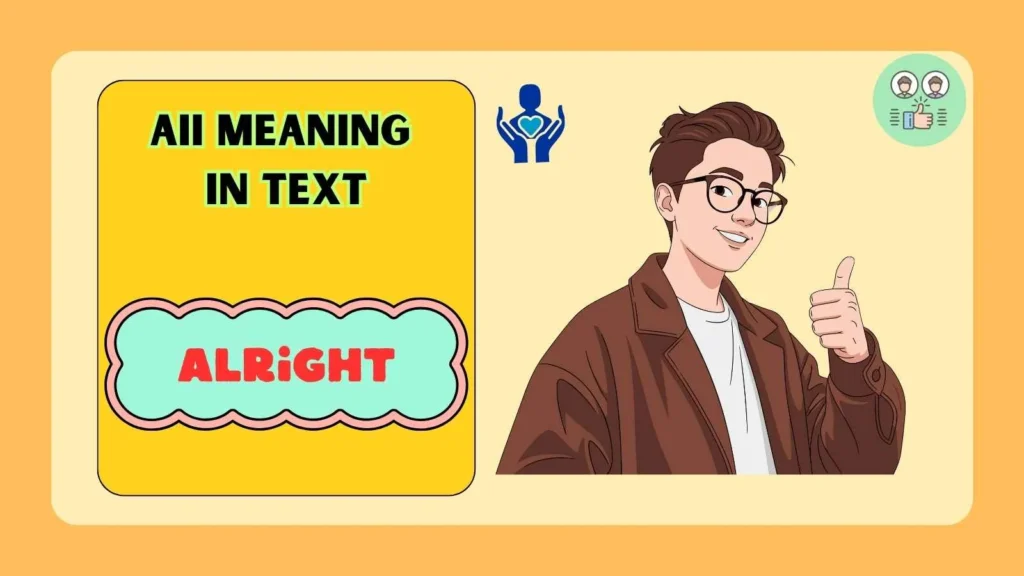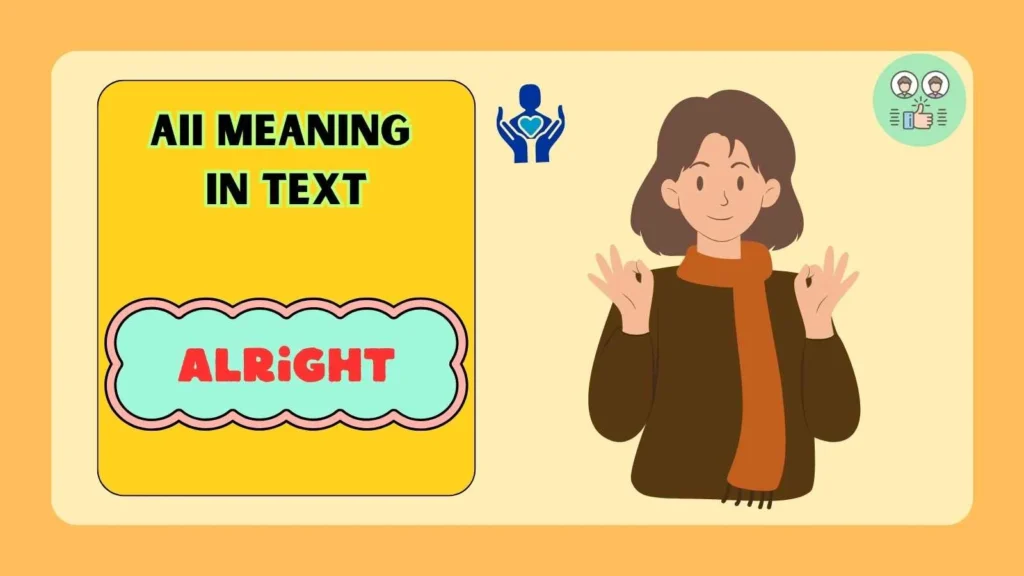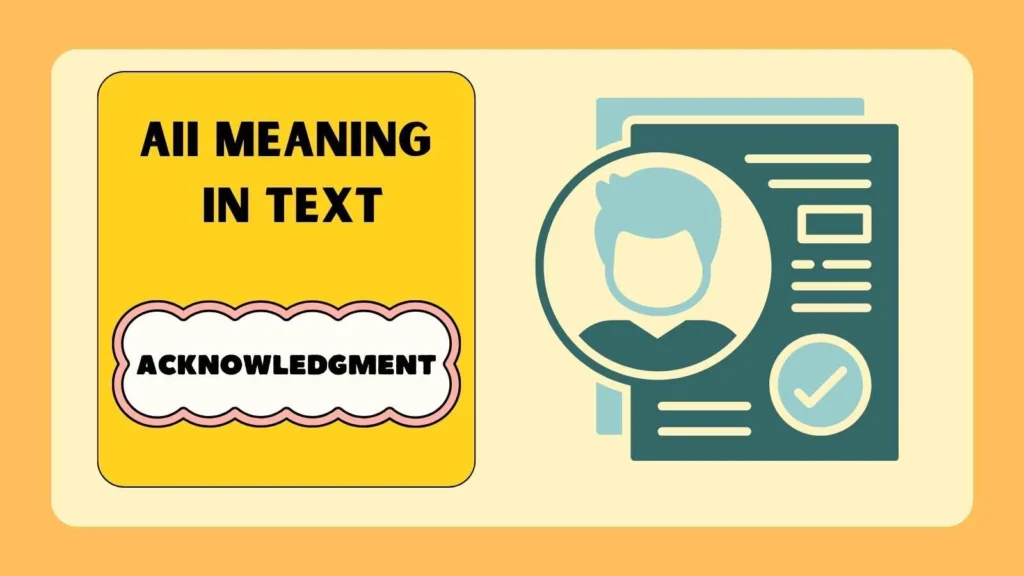Last updated on November 3rd, 2025 at 11:10 pm
What does Aii mean in text? If you’ve spotted it in conversations and wondered why everyone’s using it, you’re in the right place. This slang term is part of today’s trendy and viral language that’s spreading fast among young people.
Understanding Aii meaning in text helps you stay cool, relatable, and up-to-date with how chats really flow in the modern world of social media.
Whether you’re trying to decode TikTok comments, laugh at memes, or just look more authentic in conversations, learning these shortcuts keeps your style fresh, fun, and casual.
Slang isn’t just random it’s a popular way to connect instantly and keep conversations engaging.
Definition & Meaning
At its core, “aii” is an informal expression used in text conversations to indicate agreement, acknowledgment, or acceptance. Most commonly, it is understood as a casual form of saying “alright” or “okay.” The double “i” adds an extra tone, making it appear softer or more relaxed than the straightforward “ai” or “ok.”
For instance:
- Friend A: “I’ll pick you up at 7.”
- Friend B: “Aii, sounds good.”
In this sense, “aii” works as a laid-back confirmation. Sometimes, the way it’s written may also reflect tone—whether cheerful, sarcastic, or dismissive—depending on context.
Background & History
The origin of “aii” is a bit fuzzy, as it comes from casual, everyday online language rather than formal dictionaries. Many linguists trace it back to African American Vernacular English (AAVE) and urban slang, where “aiight” or “aight” meant “alright.” Over time, with the rise of SMS texting, people began shortening and altering spellings to match quick typing styles.
Social platforms like MSN Messenger, MySpace, and later Twitter and TikTok, spread variations like aii, aiight, and aight across global audiences. The internet’s culture of abbreviation and phonetic spelling allowed “aii” to evolve into a common casual text response, particularly among Gen Z and Millennials.
Usage in Various Contexts
The meaning of “aii” in text shifts based on context:
- Agreement: Used to confirm plans (“Aii, let’s do it”).
- Reassurance: As a way of saying everything is fine (“Don’t worry, I’m aii”).
- Flirtation: Sometimes paired with emojis for a playful vibe (“Aii 😉 I see you”).
- Sarcasm: Can imply indifference (“Aii, whatever you say”).
- Casual Reply: When someone doesn’t want to overthink a response, “aii” fills the gap.
Tone is everything—what feels supportive in one chat may feel dismissive in another.
Common Misconceptions & Clarifications
- Not an acronym – Unlike LOL or BRB, “aii” is not an abbreviation but a stylized spelling.
- Not always positive – While often agreeable, it can also suggest disinterest.
- Not universal – Some people may never use it, while others use it daily.
- Not formal – It is strictly casual and should be avoided in professional communication.
Similar Terms & Alternatives
Depending on tone, people often use alternatives like:
- Aight
- Alright
- Ok / Okay
- Bet
- For sure
- Cool
These variations may carry slightly different energy, but all work in casual conversations.
How to Respond to This Term
When someone texts “aii,” your response depends on the vibe:
- If confirming: respond with another acknowledgment (“Cool” / “Bet”).
- If dismissive: clarify tone with a follow-up question.
- If flirty: play along with emojis or light teasing.
- If unsure: ask directly what they mean to avoid misreading the intent.
Regional or Cultural Differences
In North America, “aii” is tied to urban slang and hip-hop culture. And in Caribbean English, it often overlaps with “aight.”
In South Asia and Africa, younger generations adopted it through social media, where it signals coolness or casual acknowledgment. Cultural background often shapes whether “aii” sounds warm, dismissive, or stylish.
Comparison with Similar Terms
- “Aight” vs. “Aii”: Aight feels closer to speech; aii is more visual/text-based.
- “Bet” vs. “Aii”: Bet implies excitement; aii is neutral.
- “Okay” vs. “Aii”: Okay is more universal and neutral; aii leans casual and slangy.
Usage in Online Communities & Dating Apps
On platforms like TikTok, Twitter, or Snapchat, “aii” often shows up in memes, captions, and replies. On dating apps, it can signal playfulness—someone agreeing casually without sounding too serious. However, overuse may make you seem uninterested, so balance matters.
Hidden or Offensive Meanings
Generally, “aii” is harmless. But tone can twist it:
- Used dismissively, it may come across as rude.
- In heated arguments, “aii” may imply sarcasm, like “whatever.”
- It rarely carries direct offensive meaning, but misinterpretation can cause tension.
Suitability for Professional Communication
“Aii” is not suitable for formal emails, work chats, or business settings. In professional communication, always stick to “Okay,” “Alright,” or “Understood.” Using slang like “aii” can seem unprofessional or careless in workplaces.
💬 Aii Meaning in Text from a Boy

- 😎 Usually means “Alright” or “Okay” — a chill, casual response.
- 💭 Shows he’s agreeing but keeping things cool and low-key.
- 🕶️ Used when he doesn’t want to sound too formal or emotional.
- 💬 Often replaces “yeah” or “sure” in quick replies.
- ⚡ Indicates he’s comfortable but not overly expressive.
- 🧠 Sometimes used to end a conversation politely without sounding rude.
- 💞 In flirty chats, “Aii 😏” can mean he’s teasing or being playful.
- 📱 Common in texting, gaming chats, and Snapchat replies.
- 🚀 Suggests confidence — he’s relaxed and in control.
- 🎯 Overall, when a boy says “Aii,” he usually means “cool, I got it.”
💖 Aii Meaning from a Girl

- 💬 When a girl texts “Aii,” it typically means “Alright” or “Fine.”
- 😇 Can show agreement, but with a slightly softer or playful tone.
- 💅 If written as “Aii 😌,” it might signal mild attitude or sass.
- 🧠 Used to acknowledge something without much emotion.
- 😂 In friendly chats, it’s light-hearted and easygoing.
- 🔥 Sometimes expresses flirty sarcasm, depending on tone or emojis.
- 💬 “Aii 🤭” could mean she’s amused but not saying much.
- 🌈 Suggests she’s comfortable with the person she’s texting.
- 💞 Shows casual, modern slang often used by Gen Z girls.
- 🎀 In short, when a girl says “Aii,” she’s likely saying “yeah, sure” with personality.
🎵 What Does Aii Mean on TikTok
- 📱 On TikTok, “Aii” stands for “Alright” or “Okay” in captions and comments.
- 😂 Often used to add humor, sarcasm, or emphasis to reactions.
- 🔥 Creators drop “Aii” to show confidence or dramatic effect.
- 🎶 Appears in audio clips, memes, or dance challenges as part of slang culture.
- 💬 Can mean “I see you” or “Got it,” depending on the trend.
- 😎 Commonly seen in comments hyping someone up, like “Aii he did that!”
- 🧠 Reflects TikTok’s fast, expressive communication style.
- 📈 Gained popularity through viral sounds and Gen Z slang videos.
- ✨ Used across captions, replies, and hashtags to sound fun and trendy.
- 🌍 Overall, “Aii” on TikTok means cool acknowledgment with attitude.
FAQs
What does aii mean in text?
It usually means “alright” or “okay” in casual conversation.
Is aii slang?
Yes, it is a form of slang often used online or in texting.
Does aii mean the same as aight?
They are similar, but “aight” feels closer to spoken slang while “aii” is more text-friendly.
Can aii be rude?
Yes, depending on tone, it may sound dismissive or sarcastic.
Is aii used in professional settings?
No, it’s strictly informal and not suited for work communication.
Who uses aii the most?
Mostly Gen Z and Millennials in casual texting or online chats.
Conclusion
The phrase “aii” in text may look small, but it carries a world of casual meaning. It’s a versatile term that can show agreement, reassurance, sarcasm, or even flirtation depending on context.
With roots in urban slang and online culture, it has spread globally across generations. However, its informality makes it best for personal conversations not professional ones.
Understanding “aii” ensures smoother chats, fewer miscommunications, and a better grasp of internet slang. Next time you see “aii” pop up, you’ll know exactly how to read between the lines.
